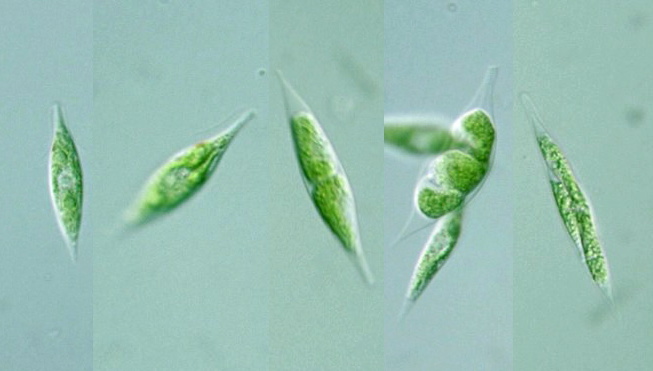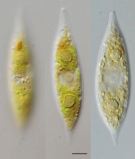

Chlorophyceae: Chlamydomonadales (Volvocales): Chlamydomonadaceae
Chlamydophyceae: Chlamydomonadales: Haematococcaceae
Volvocida: Chlamydomonadina: Chlamydomonadidae
Chlorogonium elongatum
(Dangeard) Francé 1897 (An Illustrated Guide to Freshwater Zooplankton in Japan, 2000)
(Dangeard) Dangeard 1899 (Süßwasserflora von Mitteleuropa 9, Chlorophyta I, 1983)
identified by Takashi Nakada (
Department of Biological Sciences,
Graduate School of Science,
University of Tokyo)
 Species:
Cell body fusiform or elongated ovoid, 20-53 μm long, tapered at both ends, cell wall thin,
chloroplasts plate-like, with two large pyrenoids one located at anterior half and another at posterior half,
stigma ovoid or pear-shaped, located at anterior 1/4-1/3 of the cell body, many contractile vacuoles
(An Illustrated Guide to Freshwater Zooplankton in Japan, 2000).
Species:
Cell body fusiform or elongated ovoid, 20-53 μm long, tapered at both ends, cell wall thin,
chloroplasts plate-like, with two large pyrenoids one located at anterior half and another at posterior half,
stigma ovoid or pear-shaped, located at anterior 1/4-1/3 of the cell body, many contractile vacuoles
(An Illustrated Guide to Freshwater Zooplankton in Japan, 2000).
Cell body fusiform to spindle-shaped, 20-80(-120) μm long, 4-10(-12) μm wide;
stigma longitudinally elongated elliptical, located close to tapering anterior end;
[var. truncatum Skuja 1956]: 20-35 μm long, 3-5 μm wide;
[var. opulentum Ettl 1960]: 120-155 μm long, 10-12 μm wide;
[var. gigas Hortobagyi 1979]: 100-110 μm long, 15-17 μm wide;
(Süßwasserflora von Mitteleuropa 9, Chlorophyta I, 1983).
Cell body spindle-shaped, 23-50 μm long, 4-9 μm wide
(Illustrations of The Japanese Fresh-water Algae, 1977).
|
Chlorogonium elongatum (Dangeard) Dangeard, stock Skmo-2, identified by T. Nakada,
axenic culture with 2YN (May 13 to May 24, 2004),
cell body spindle-shaped, both ends tapered, up to 70 μm long, 10 μm wide,
x 640, Oh-asoh (very close to Ara-kawa), Kumagaya city, Saitama Pref., Japan, February 29, 2004 by Y. Tsukii
 31 μm
31 μm
 63 μm
63 μm
 94 μm; x 640
94 μm; x 640








Chlorogonium elongatum (Dangeard) Dangeard, stock Skmo-2, identified by T. Nakada,
axenic culture, bar represents 5 μm,
x 640, Oh-asoh (very close to Ara-kawa), Kumagaya city, Saitama Pref., Japan, February 29, 2004
collected by Y. Tsukii, photo by T. Nakada

Chlorogonium elongatum (Dangeard) Dangeard, identified by T. Nakada,
stock Skmo-2, axenic culture (February 7 to February 21, 2006)
cell body 42-47 μm long, 8 μm wide, L/W=5.3-5.9,
x 640, Oh-asoh (very close to Ara-kawa), Kumagaya city, Saitama Pref., Japan, February 29, 2004 by Y. Tsukii
 31 μm
31 μm
 63 μm
63 μm
 94 μm; x 640
94 μm; x 640



Chlorogonium neglectum Pascher, 1927 (Syn.: Chlamydomonas neglecta (Pascher) Korshikov, 1938):
Cell body fusiform or ovoid, 11-19 μm long, cell wall thin,
chloroplasts plate-like, with a single pyrenoid located at the center of the cell body,
both ends not pointed, stigma ovoid or ellipsoidal in shape, located at anterior half of the cell body, many contractile vacuoles
(An Illustrated Guide to Freshwater Zooplankton in Japan, 2000).
* Chlorogonium elongatum (Dangeard) Francé, 1897:
Cell body fusiform or elongated ovoid, 20-53 μm long, tapered at both ends, cell wall thin,
chloroplasts plate-like,
with two large pyrenoids one located at anterior half and another at posterior half,
stigma ovoid or pear-shaped, located at anterior 1/4-1/3 of the cell body, many contractile vacuoles
(An Illustrated Guide to Freshwater Zooplankton in Japan, 2000).
Chlorogonium euchlorum Ehrenberg, 1837:
Cell body fusiform or elongated ovoid, 17-59 μm long, tapered at both ends, cell wall thin,
chloroplasts plate-like, with 2-8 pyrenoids,
stigma ovoid or nearly spherical, located at anterior 1/6-1/4 of the cell body, many contractile vacuoles
(An Illustrated Guide to Freshwater Zooplankton in Japan, 2000).
Cell body 25-70(-100) μm long, 4-15(-20) μm wide
(Ettl, Chlorophyta I, Süßwasserflora von Mitteleuropa Band 9, 1983).
Cell body 60-80 μm long, 8-12 μm wide, 4-8 pyrenoids
(Illustrations of The Japanese Fresh-water Algae, 1977).
Chlorogonium capillatum Nozaki, Watanabe et Aizawa, 1995:
Cell body fusiform or ovoid, 30-52 μm long, not tapered at both ends, cell wall thin,
chloroplasts elongated cup-shaped, with many (-12) pyrenoids, both ends not pointed,
stigma ovoidal, located at anterior half of the cell body, many contractile vacuoles
(An Illustrated Guide to Freshwater Zooplankton in Japan, 2000).
Chlorogonium fusiforme Matvienko, 1938:
Cell body fusiform, 16-27 μm long, not tapered at both ends, cell wall thin,
chloroplasts plate-like, with a single pyrenoid located at the center of the cell body,
stigma circular or ellipsoidal, located at anterior half of the cell body, many contractile vacuoles
(An Illustrated Guide to Freshwater Zooplankton in Japan, 2000).
Chlorogonium ellipsoideum Skvortzow & Noda, 1967:
Cell body 11-33 μm long, not tapered at both ends, cell wall thick,
chloroplasts plate-like, without pyrenoids,
stigma elongated in shape, located at equator of the cell, several contractile vacuoles
(An Illustrated Guide to Freshwater Zooplankton in Japan, 2000).
Chlorogonium latilaneolatum Skvortzow & Noda, 1967:
Cell body fusiform, 20-25 μm long, posterior end slightly tapered, cell wall thin,
chloroplasts plate-like, without pyrenoids, stigma located at anterior half of the cell body,
contractile vacuoles 2-5
(An Illustrated Guide to Freshwater Zooplankton in Japan, 2000).
Chlorogonium ovatum Skvortzow & Noda, 1967:
Cell body 10-37 μm long, both ends not tapered, cell wall thick,
chloroplasts reticulated, without pyrenoids, without stigma, contractile vacuoles indistinguishable
(An Illustrated Guide to Freshwater Zooplankton in Japan, 2000).
Please click on images for viewing enlarged.
Copyright
Protist Information Server
 Species:
Cell body fusiform or elongated ovoid, 20-53 μm long, tapered at both ends, cell wall thin,
chloroplasts plate-like, with two large pyrenoids one located at anterior half and another at posterior half,
stigma ovoid or pear-shaped, located at anterior 1/4-1/3 of the cell body, many contractile vacuoles
(An Illustrated Guide to Freshwater Zooplankton in Japan, 2000).
Species:
Cell body fusiform or elongated ovoid, 20-53 μm long, tapered at both ends, cell wall thin,
chloroplasts plate-like, with two large pyrenoids one located at anterior half and another at posterior half,
stigma ovoid or pear-shaped, located at anterior 1/4-1/3 of the cell body, many contractile vacuoles
(An Illustrated Guide to Freshwater Zooplankton in Japan, 2000).











